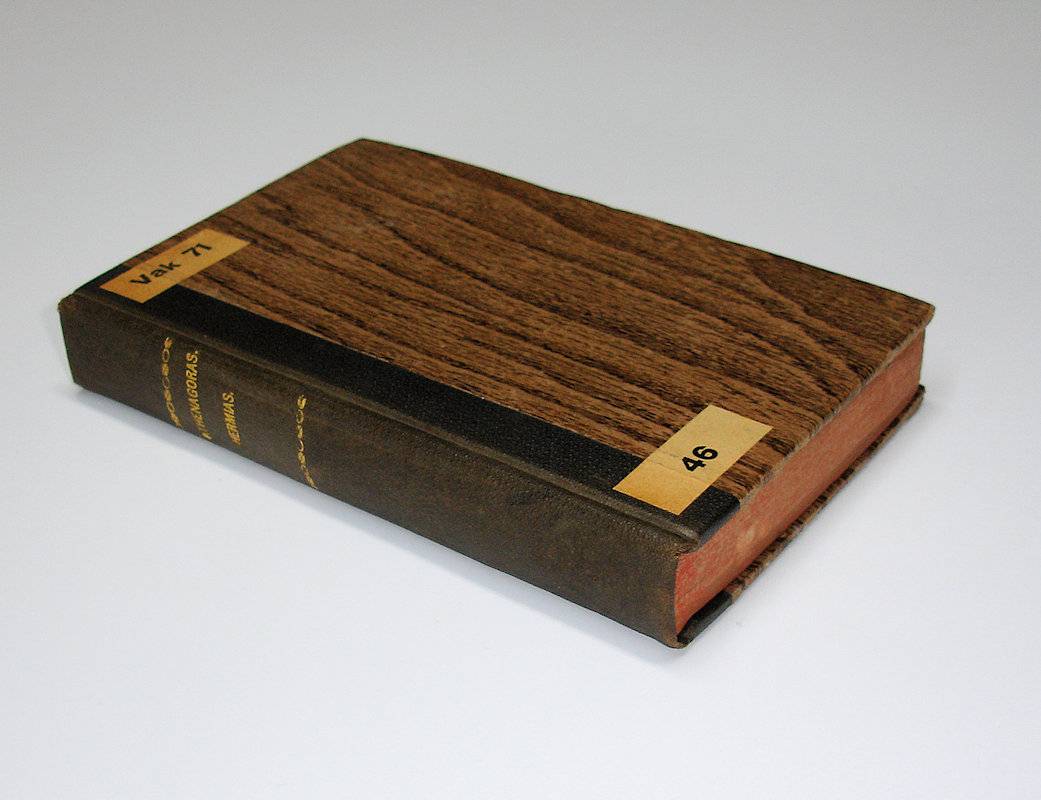ATHENAGORAS & HERMIAS PHILOSOPHUS.
Sancti Athenagorae Atheniensis Philosophi Deprecationem (vulgo Legationem) pro Christianis. Edidit M. Io.Gottlieb Lindner, rector Scholae Arnstadiensis. (Bound with:) HERMIOU PHILOSOPHOU DIASURMOS TÔN EXÔ PHILOSOPHÔN. Hermiae Philosophi Gentilium Philosophorum Irrisio. Cum adnotationibus Hier. Wolfii, Thomae Galei, Wilh. Worthii suisque. Graece in usum praelectionum separatim edidit Jo. Christoph. Dommerich, dialect. et philosoph. primae professor P.O. in Academia Helmstadiensi.
Langensalza (Longosalissae), Sumptibus Io.Chr. Martini, 1774. Ad 2: Halle (Halae), Apud Carolum Hermannum Hemmerde, 1764.
8vo. 2 volumes in 1: XXXIV,238,(28 index); 108,(3),(1 blank) p. Late 19th century half cloth 17 cm (
Ref: Ad
1: Hoffmann 1,400: 'Dem Text sind schätzbare Anmerkungen beigefügt'; Brunet 1,537; Graesse 1,245; Ebert 1322;
Ad 2: Hoffmann 2,214; Brunet 3,117: 'Seule édition séparée de cet ouvrage'; Graesse 3,251; Ebert 9495) (
Details: Some woodcut ornaments.
Ad 1: After the introduction comes the Greek text, with at the lower part of the pages some critical notes and the commentary.
Ad 2: After the introduction come 16 pages with the Greek text, followed by 70 pages commentary) (
Condition: 19th century binding. Two small paper labels with shelf numbers on the frontcover. Two small stamps on the title. Title of first work slightly soiled. Paper of second work yellowing) (
Note: Athenagoras of Athens, a converted pagan philosopher, was a Christian apologist who addressed between 176 and 180 AD an apology, called 'presbeia' (legatio) to the emperor Marcus Aurelius Antoninus (died 180) and Commodus (appointed 176), in which he refuted traditional charges against the Christians, of atheism, canibalism, and incest. Athenagoras is considered to be the most eloquent of the Greek apologists. His 'Legatio', in this 1774 edition called 'Deprecatio', is in the form of a speech composed according to the rules of Greek rhetoric. Through his wide reading in pagan literature he had a good grip of Greek philosophy and religion. He used technical philosophic terms that were current among educated pagans. His style is elegant, 'free from superfluous expressions, forcible and at times rising to great heights of descriptive power. His arrangements of material is always clear and his argument moves forward quietly and majestically. Even when apparent irrelevant mythological references are introduced they are made to serve Athenagoras' purpose of holding the hearer's and reader's attention and providing interesting information'. (L.W. Barnard, 'Athenagoras: A Study in Second Century Christian Apologetic', Paris, 1972, p. 32)
§ Johann Gottlieb Lindner, born in 1726, was appointed Prorector of the school in Langensalza through the agency of Ernesti. In 1765 be became Rector of this local Lyceum. He died in 1811. (Allgemeine Deutsche Biographie 18/705-706) His notes to Athenagoras deserve particular attention.
Ad 2: Hermias Philosophus 'was an obscure Christian Apologist, presumed to have lived in 3rd century. Nothing is known of him, except his name. He wrote a Derision of heathen philosophers ('diasurmos tôn hexo philosophôn', in Latin 'Gentilium Philosophorum Irrisio'), a short parody on Greek philosophy themes (the nature of the body, the soul, the world). From Paul's statement in the First Epistle to the Corinthians that 'all worldly knowledge is madness from God' he affirms that all philosophical doctrines come from the apostasy of the angels and are therefore wrong and laughable. Hermias relies rather on cynical and skeptical culture critique and on philosophical biographies and anedoctes than in their real writings if he had ever read them'. (Source: Wikipedia's article 'Hermias', which offers also a link to the English translation by J.A.Giles, 1857. See also the pages on Hermias on the site: 'The Tertullian Project'
§ Johann Christoph Dommerich, 1723-1767, was since 1759 professor of 'Logik und Metaphysik' at the University of Helmstedt (Allgemeine Deutsche Biographie 5/326-327) (
Provenance: On the title a stamp of 'Bibliotheca Conventus Woerdensis', and of 'Studiehuis Minderbroeders Nijmegen') (
Collation: a-c8, A-R8 (minus the blank leaves R6, R7 & R8); A-G8 (leaf G8 verso blank)) (Photographs on request)
Book number: 120380 Euro 180.00
Keywords: (Oude Druk), (Rare Books), Apologie, Apology, Hermias, Spätantike, ancient philosophy, antike Philosophie, antike altertum antiquity, early christianity, frühes Christentum, late antiquity
 ATHENAGORAS & HERMIAS PHILOSOPHUS.
ATHENAGORAS & HERMIAS PHILOSOPHUS.